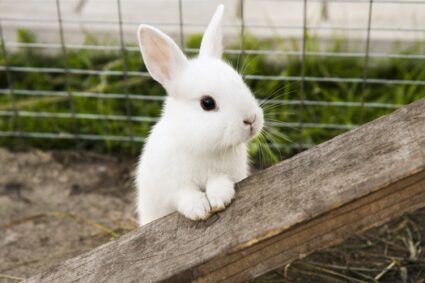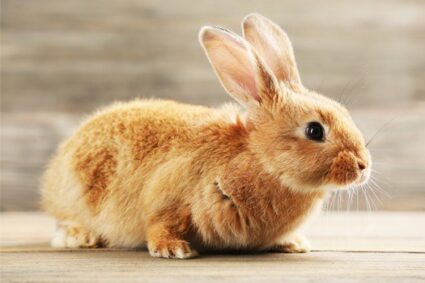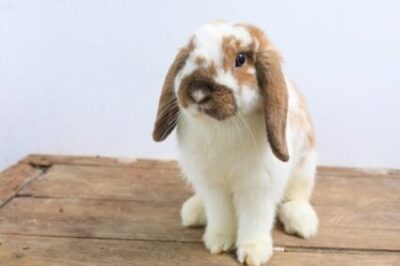If you see a rabbit in the wild, it’s unlikely to be alone. Rabbits travel in pairs and large groups, protecting each other from predators. While rabbits do need time on their own occasionally, they dislike being alone. This is why rabbits are so often sold and kept in bonded pairs.
Rabbits are social animals, so a single rabbit is likely to feel lonely and depressed. Rabbits can live alone, but you’ll need to provide your pet with the attention (company, petting, grooming, exercise, playing, and enrichment) that a bonded rabbit partner would provide.
It’s always advisable to keep rabbits in pairs. If you can find a pair of rabbits that are already bonded, so much the better. These rabbits should not be separated, and they’ll keep each other company. Keeping two bonded rabbits will cost more, but it’ll half your responsibilities.
Do Rabbits Get Lonely Without Another Rabbit?
Your rabbit will likely become lonely without the company of another rabbit. Rabbits are hardwired to be social. Wild rabbits live in large colonies, so the species instinctively seeks company.
Part of this is due to survival instinct. Wild rabbits understand that there is safety in numbers. The more rabbits live together, the higher the likelihood of predator being spotted.
Your domesticated rabbit will be kept safe from predators. All the same, unless your pet is a rare antisocial rabbit, she will desire company. Keeping her alone will likely make her lonely.
How Do I Know if My Rabbit is Lonely?
Lonely rabbit behavior includes the following:
- Wants more attention. This could involve nudging, nipping, and biting you.
- Hyperactivity. She has so much energy and nobody to share it with.
- Destructive behavior. She is frustrated and lonely, taking it out on furniture and belongings.
- Withdrawn and depressed. She will stop responding when called. She may even lose interest in eating and drinking.
Can Rabbits Die of Loneliness?
No vet will write, “loneliness” as the cause of death following a rabbit autopsy. Loneliness can kill a rabbit, albeit indirectly. Isolation in rabbits leads to boredom. Rabbits want to play, and to interact. Your pet will do this with you if she must. She would prefer it to be with a fellow rabbit, though.
When a rabbit becomes stressed, her health will deteriorate. A rabbit’s heart is as frail as her delicate skeleton. Stress can cause cardiac arrest, or accelerate other health problems.
Stress and loneliness can be linked to bereavement in rabbits. If your pet had a bonded partner that suddenly disappears, it’s stressful. Your pet misses her friend and wonders if she’ll be next.

What Happens if One of My Rabbits Dies?
When two rabbits bond, they usually do so for life, but this doesn’t mean they’ll live forever. Typically, one rabbit will outlive a partner. Rabbits are believed to have some understanding of death. If your pet sees the corpse of a partner, she will not be traumatized. It will aid her understanding.
As BunnyHugga explains, your rabbit may even seem jolly at first. She will perform a form of dance over the body of her partner. This is your rabbit saying goodbye to her treasured friend. Just like in humans, grief does strange things to rabbits.
Eventually, you’ll need to consider a new, second rabbit. Once a rabbit gets used to living as a pair, she’ll rarely cope with being alone. The bonding process may take time as it’s not easy to replace a bonded partner. Just don’t rush the bonding process.
Can Rabbits Live Alone Happily?
Rabbits can live alone, and may even thrive with a solitary lifestyle. You will need to be more actively involved, though. This means not leaving your rabbit alone for a prolonged period of time.
If you work long hours, a single rabbit is not an option for you. The only way this could work is if you hire a pet sitter. This way, at least somebody will keep your rabbit company.
Let your rabbit run free around the home if she is a solo pet. Life alone in a hutch can be very lonely. This will be compounded by the fact that rabbits keep a different schedule to humans. Let’s take a look at a typical day in the life of a rabbit:
| Daybreak | Your rabbit will wake up at dawn. She’ll have a snack, use her litter tray, and seek entertainment. In her hutch, this would involve toys. She’ll wake you up for attention. |
| Early Morning to Mid-Morning | This is the time that your rabbit will be most active. She’ll want to run, jump, and play. Ensure that she can enjoy outside time at this point. |
| Mid-Morning to Late Afternoon | After a while, your rabbit will exhaust herself. She may well fall asleep. If she has a hutch, return her for a nap. If she runs free, place your pet somewhere quiet and comfy. |
| Late Afternoon to Early Evening | Your rabbit will wake up from her afternoon nap feeling refreshed. She’ll eat, use her litter tray, and groom herself. She will then expect attention again. |
| Early Evening to (Human) Bedtime | After an initial flurry of activity, your rabbit will calm down. Don’t be surprised if your rabbit sits in your lap. |
| Human Bedtime | Rabbits tend to active after humans retire for the night. Your pet is unlikely to want to return to her hutch alone. She’ll want to sleep on your bed. |
My Rabbit Likes Living Alone
It’s rare, but sometimes rabbits actively prefer to live alone. This will be more prevalent in female rabbits. The female of this species tends to be more independent.
Most often, this will be because the rabbit had a miserable shared experience previously. Also, rabbits are territorial. Your pet may struggle with the idea of sharing space and food.
If your rabbit appears antisocial with her own species, you’ll need to consider alternatives. A rabbit that does not like other rabbits will still dislike being alone for too long.
This leaves you with two options. Dedicate more of your own time to your rabbit, or pair her with a different pet. Rabbits can forge unlikely friendships with animals of different species.

Can Other Animals Keep a Rabbit Company?
You could consider housing your pet with a different animal. Rabbits and chickens can live together. If you have a sizable outdoor space, this could be an ideal solution for both animals. They’ll keep each company, and with the right safety protocols, live harmoniously.
Some people house rabbits with guinea pigs. While similar in theory, these small animals have several differences. They eat different diets and have different play styles. This can result in miscommunication, injury, and health concerns.
If you have a cat or dog, you should ensure your rabbit is kept separate from them. They can get along, but cats and dogs have hunting instincts. Remember that rabbits are a prey species.
Rabbits are unique animals. With this in mind, they should be housed with fellow rabbits. If you keep two bonded rabbits together, both will be completely content.


Information incomplete. A buck and doe kept together is not a good idea, two bucks can be worse.
Can u give more information please as I’m unsure whether to get one or two rabbits as I had one twice with no problems but last time had cat and chickens. Now it will be alone. We plan to get kitten in couple of months but want to know if bunny will be ok alone. Please reply
It depends on the rabbit because some can have anxiety. I personally have never had a rabbit, but I know if you pay attention to your rabbit you can sometimes go without any problems.
It’s best to have a pair of rabbits. Yes, you keep your rabbit company, but there are certain emotional things you cannot do for your rabbit. I advise getting two rabbits. Most rabbits are happiest in bonded pairs. But all rabbits hate being alone.
According to my research, a spayed female rabbit and neutered male rabbit is the best bond. Two males can work, although you’ll need to put more time into bonding them. Two females is the hardest bond. Generally females are more independent than males. Always wait at least a month, preferably a bit longer, after the rabbits are spayed and neutered before attempting to bond them.
From experience, I’ve observed that rabbits are so territorial that they prefer to be the only pet. Rabbits of the same sex can fight to death for the dominance, and the only ones I saw bonding were mother and daugther (mother becoming the dominant). Well, my rabbits were always non-neutered farm rabbits, so I don’t know about other more domesticated races like lops or dwarfs.
It has been well over a year and still my rabbits won’t bond we lost two from illness and injury over the years all spayed females and the remaining original rabbit had bonded with both she just doesn’t like the spayed younger male, I don’t blame her he always scratches and bites her, so I have them in Separate pens inside at winter and outside in spring summer side by side so they can sniff each other out. What else can I do to get them to bond?
We just purchased a Mini male rex who is about 10 weeks old. We were looking at purchasing a Polish wh0 is 10 months old as a companion. Neither are fixed. Is this a good fix?
I was thinking of adopting 2 neutered males from someone trying to rehome them, until she said they have to stay separate because they’ll fight. Would it be OK to adopt only one, since they aren’t housed together? Or might that be too much of a shock to be separated?
I’m completely lost. I rescued an older rabbit from it owner who kept it caged all day on a porch in the heat and full of its own feces. Now that it’s in my house it’s difficult to understand my bunny because it never free roamed or had any interaction with people. It has adjusted to me and my home but there’s so many things that are of habit to me that is definitely harmful to my new pet bunny. I think it’s getting used to me but at times I think it’s taking a toll on my bunny. What should I do? Continue being me and let the bunny adjust and realize it is who I am and how it’s always going to be or should I change everything I’m accustomed to too please my rabbit? I don’t want anything to happen to it due to my habits. Info please will be greatly appreciated.
Hi Kaye,
How did it go? It’s hard to say how harmful it can be without knowing what habits you’re referring to, but it doesn’t sound great for the bunny. You imply that you can change things but that it would “change everything.” You might consider what specific things would change, maybe it’s not all that bad to change things for a good pet and to help them. If you can’t change, and its an environmental thing that is bad for their health or wellbeing, the good thing to do is help find them a new forever home.
I want to adopt a single bunny, but I am away from my home from 8am-4:30-45ish, Monday to Friday. One of my family members is home pretty much all day every day, and can check up on the bunny but is not the best (most likely) at bonding with small animals. I’m going to get a pet cam and let the bunny free roam in one 4.5×5.5 meter room in my home all day and most likely all night. litter box, chairs, airflow, etc will be provided. Any advice?
I have had a single bunny for a bit over a year now. I have thought about getting him a companion however He seems to prefer being alone, which I find odd. When me and my family try to interact with him he generally runs off into his corner of the house. (it is a rare treat that he actually lets us pet and groom him) This is my first rabbit but even I find this to be a bit of an odd behavior. He doesn’t seem lonely or stressed and generally seems very healthy. I was wondering if it would be worth trying to introduce a companion given how oddly solitary my guy is.
I have had a solitary rabbit for over 9 years now and she is in excellent health. However I don’t work long hours and spend dedicated time with her. She came from a hoarder house situation – perhaps she is thankful to be a solitary buns.
Just wanted to share my experience. It honestly depends on the rabbit. Always look for signs and always adjust accordingly.